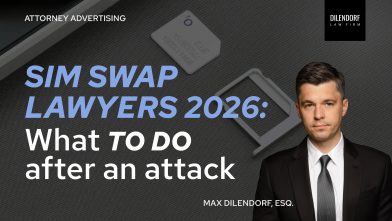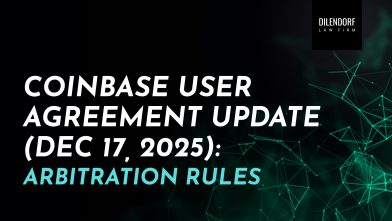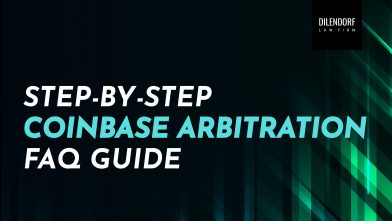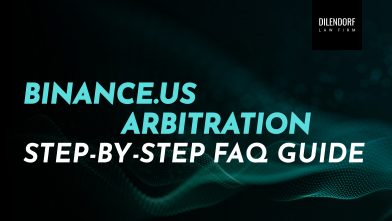Are Coinbase’s Arbitration Clauses Enforceable? Key Cases Explained
Many service providers, including Coinbase, T-Mobile, Verizon, and AT&T, include arbitration clauses in their user agreements. These provisions determine how disputes will be resolved and often require that they be handled through arbitration rather than in court.
Clients often ask whether these arbitration clauses are enforceable. In most circumstances, the answer is yes. Coinbase’s arbitration clause has been reviewed in several cases, and courts have consistently upheld its validity.
Aggarwal v. Coinbase, Inc.
In Aggarwal v. Coinbase, Inc., 685 F. Supp. 3d 867 (N.D. Cal. 2023), the plaintiffs challenged whether the Coinbase User Agreement — specifically its arbitration clause — applied to them.
The court noted:
“On February 4, 2022, Mr. El Bermawy logged into his Coinbase account via Coinbase Pro iOS mobile app and agreed to the updated 2022 User Agreement. (Zia Decl., Ex. 2.) Similarly, Mr. Aggarwal logged into his Coinbase account via Coinbase Pro iOS mobile app and agreed to the updated 2022 User Agreement on February 5, 2022.” Id. at 874.
The plaintiffs argued that “Coinbase’s arbitration agreement is illusory, and therefore unenforceable.” Id. at 875. The court disagreed, finding that the agreement was not unconscionable:
“The Court therefore compel[ed] arbitration.” Id. at 882.
It further granted “Coinbase’s motion to compel arbitration and [stayed] all further litigation pending completion of arbitration.” Iat 882.
Bielski v. Coinbase, Inc.
In Bielski v. Coinbase, Inc., 87 F.4th 1003 (9th Cir. 2023), Coinbase appealed a district court’s denial of its motion to compel arbitration.
The opinion begins:
“Defendant-Appellant Coinbase, an online cryptocurrency exchange, appeals the district court’s denial of its motion to compel arbitration of claims brought by Plaintiff-Appellee Abraham Bielski. Coinbase challenges the district court’s order at every step.” Id. at 1007.
Bielski argued that the agreement was unconscionable because it was an adhesion contract, lacked mutuality, and imposed one-sided, onerous pre-arbitration procedures. The Ninth Circuit rejected these arguments:
“We disagree, and therefore reverse the district court’s denial of Coinbase’s motion to compel arbitration.” Id. at 1013.
The court also rejected his “surprise” argument:
“Mr. Bielski’s argument that the pre-arbitration dispute resolution process establishes surprise [is rejected] because the process is neither hidden nor beyond the reasonable expectation of the user.” Id. at 1014.
The court concluded by reversing the denial of Coinbase’s motion to compel arbitration.
Federal Arbitration Act (FAA) Principles
These rulings reflect the strong federal policy in favor of enforcing arbitration agreements, as set out in the Federal Arbitration Act.
Under the FAA, arbitration clauses are valid and enforceable unless specific legal grounds exist for revocation.
Courts generally require that challenges focus specifically on the arbitration clause or delegation provision, not the entire contract.
Wu v. Uber Tech., Inc.
The New York Court of Appeals in Wu v. Uber Tech., Inc., 43 N.Y.3d 288 (2024), reinforced this principle, noting New York’s “long and strong public policy favoring arbitration.” Id. at 297.
The court stated:
“New York courts interfere as little as possible with the freedom of consenting parties to submit disputes to arbitration.” Id. at 297.
It further recognized that:
“In this case, the parties agree that the arbitration agreement in Uber’s January 2021 terms of use is governed by the Federal Arbitration Act (FAA) (9 USC § 1 et seq.).” Id. at 297.
And importantly:
“Importantly, under both the FAA and New York law, parties may agree to have an arbitrator decide not only the merits of a dispute, but also ‘”gateway” questions of “arbitrability,”’ such as whether their agreement to arbitrate covers a particular controversy or whether one party should be relieved from the agreement due to the wrongful conduct of another party.” Id. at 301.
In its conclusion, the court explained:
“Here, the consequence of plaintiff’s purported failure to carefully review Uber’s updated terms of use is that she must make her arguments regarding Uber’s allegedly deceptive and unconscionable conduct to a neutral arbitrator, not the courts.” Id. at 310.
Coinbase, Inc. v. Suski
In Coinbase, Inc. v. Suski, 602 U.S. 143 (2024), the U.S. Supreme Court addressed a situation where two contracts created conflicting provisions about who decides arbitrability.
The Court summarized:
“What happens if parties have multiple agreements that evidence a conflict over the answer to the third-order question of who decides arbitrability? … Homing in on the conflict between the delegation clause in the first contract and the forum selection clause in the second, the question becomes whether the parties agreed to send the given dispute to arbitration. And that question must be answered by a court.” Id. at 143–144.
It held:
“In cases where parties have agreed to only one contract, and that contract contains an arbitration clause with a delegation provision, then, absent a successful challenge to the delegation provision, courts must send all arbitrability disputes to arbitration. But, where, as here, parties have agreed to two contracts—one sending arbitrability disputes to arbitration, and the other … sending arbitrability disputes to the courts—a court must decide which contract governs.” Id. at 152.
Key Takeaway
Most arbitration clauses, including Coinbase’s, are enforceable under federal and state law. Exceptions exist, but they are limited. Understanding the scope of an arbitration clause — and any related delegation provision — before a dispute arises can help avoid procedural surprises later.
Contact Dilendorf Law Firm
If your cryptocurrency was stolen from the Coinbase exchange, or if you are a victim of a SIM swap attack that resulted in the theft of crypto from a U.S. exchange or a decentralized wallet such as MetaMask, contact Dilendorf Law Firm.
Our firm has over six years of experience in arbitrating these cases in all major arbitration forums, including AAA, JAMS, and NAM. We have handled over 100 arbitration cases, some of which we have taken to evidentiary hearings and won.
Email: info@dilendorf.com | Phone: 212.457.9797







